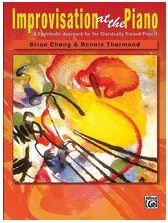
What follows are the notes I took from a session with Brian Chung at the 2010 Michigan Music Teachers Association conference.
CLASSICAL IMPROVISATION ~ by Brian Chung
Introduction
Is improvisation really for jazz only? Why can’t we classical pianists learn improvisation from our own tradition (as did Liszt, Clara Schumann, and others)?
Two goals for today: (1) You can be a capable improviser; (2) You can pass it on to your students.
Seven Principles of Improvisation:
- Everyone improvises.
- Start simply, grow gradually.
- Transpose everything.
- When in doubt, chart a path and go!
- Bring to bear what’s already there.
- Harmony dictates the bast notes to play.
- No wrong notes in improvisation.
Expressive elements of music include: harmony, phrasing, dynamics, duration, rhythm, articulation, melody, tone — and the one we most often forget — SILENCE! These are important elements to remember when improvising.
Mr. Chung led us through a number of improvisation activities that teachers can do themselves or with their student. The activities began with simple rhythmic and melodic activities, beginning with an activity called “Ode to Mr. Morse,” which involves making the most of just one note!
The next level of improvisation activities begins using “vocabulary” such as scales, skips, upper and lower neighbor tones, etc. One example: assigning for a student add upper and lower neighbor tones to a current repertoire piece.
The next step is to slowly began adding harmony (which he refers to as the “grammar” of improvisation). Mr. Chung used existing pieces (the examples he used included Eric Satie’s Gymnopedie, Beethoven’s Fur Elise, and the Chopin Minute Waltz) as the basis for these improvisation activities. Once the student has learned the piece, the student can analyze the chord progression and then improvise over the harmonies.
Mr. Chung’s method of improvisation is very methodical and theory-based, and is geared toward the classically trained students and teachers. These notes are just a brief summary of all the exercises he demonstrated! Mr. Chung has written a book with Dennis Thurmond entitled: Improvisation at the Piano: A Systematic Approach for the Classically Trained Pianists. The ideas mentioned in his presentation and in these notes come from his book mentioned in the links below…
For Further Reading
- Visit Brian Chung’s website at brianchung.net.
- Check out the book Improvisation at the Piano: A Systematic Approach for Classically Trained Pianists written by Brian Chung and Dennis Thurmond, and published by Alfred. Also view it on Amazon, where you can read user reviews.
- Visit improvisationatthepiano.com to see sample lesson plans and FAQ’s about the book Improvisation at the Piano.


